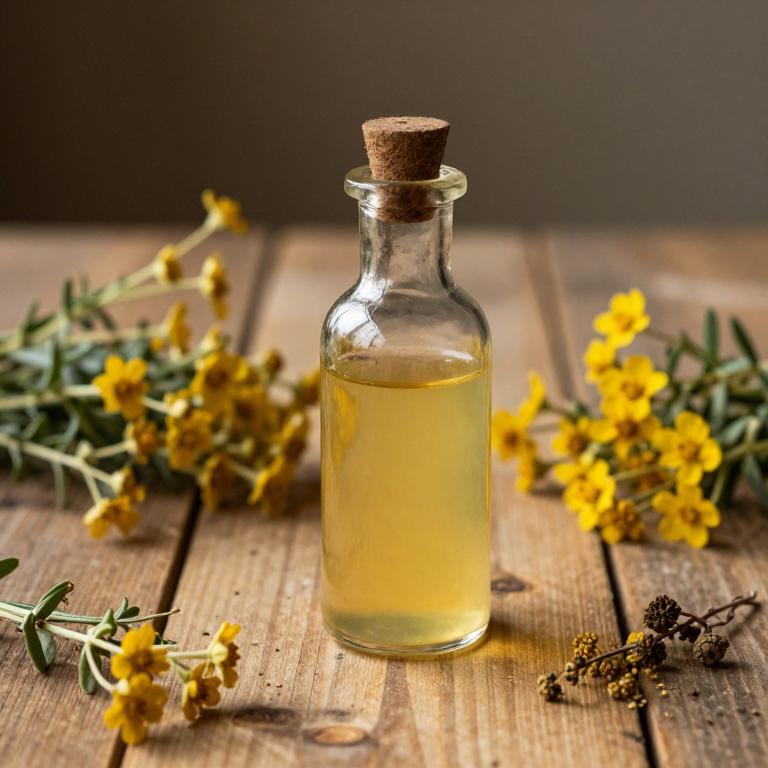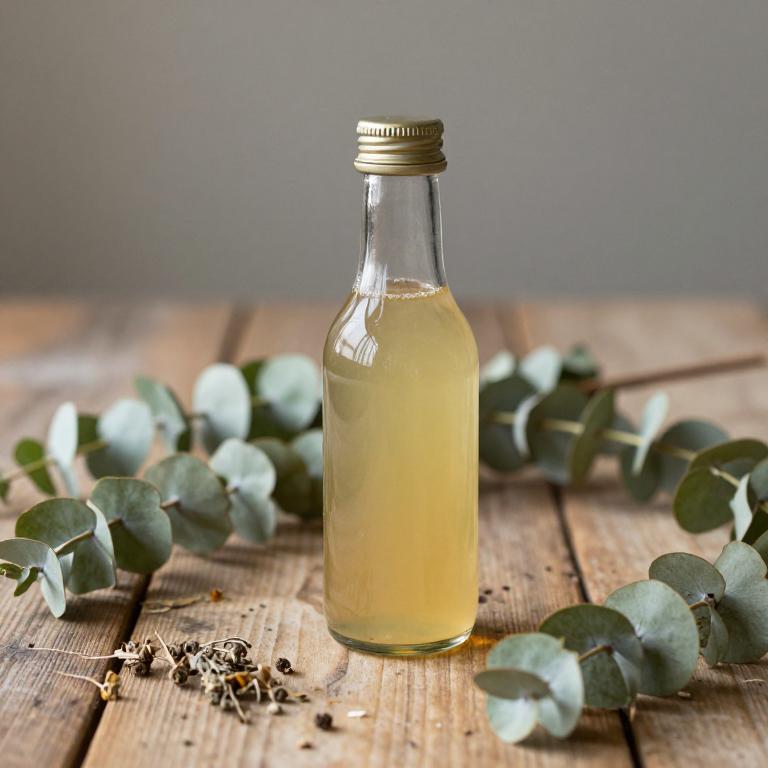10 Best Herbal Juices For Post Nasal Drip

Herbal juices can be a natural and soothing remedy for post-nasal drip, offering gentle relief without the side effects of over-the-counter medications.
Ingredients like ginger, turmeric, and echinacea are commonly used in herbal juices due to their anti-inflammatory and immune-boosting properties. These juices can help reduce mucus production and ease throat irritation by promoting healthy respiratory function. To prepare a soothing blend, combine fresh ginger root, a pinch of turmeric, and a splash of lemon juice in water or a base of green juice.
Regular consumption of such herbal juices may support overall respiratory health and alleviate symptoms associated with post-nasal drip.
Table of Contents
- 1. Stinging nettle (Urtica dioica)
- 2. Ginger (Zingiber officinale)
- 3. Thyme (Thymus vulgaris)
- 4. Peppermint (Mentha piperita)
- 5. Salvia (Salvia officinalis)
- 6. Eucalyptus (Eucalyptus globulus)
- 7. Licorice (Glycyrrhiza glabra)
- 8. Rosemary (Rosmarinus officinalis)
- 9. Turmeric (Curcuma longa)
- 10. Fennel (Foeniculum vulgare)
1. Stinging nettle (Urtica dioica)

Urtica dioica, commonly known as stinging nettle, has been traditionally used for its potential therapeutic properties, including its role in alleviating symptoms of postnasal drip.
The leaves and stems of this plant contain high levels of minerals, antioxidants, and anti-inflammatory compounds that may help reduce mucus production and soothe irritated nasal passages. Herbal juices made from Urtica dioica can be prepared by juicing fresh leaves and stems, often combined with other complementary herbs for enhanced efficacy. Some studies suggest that nettle juice may help thin mucus and ease congestion, making it a natural alternative for those seeking relief from postnasal drip without pharmaceuticals.
However, it is important to consult a healthcare provider before using nettle juice, especially for individuals with allergies or existing health conditions.
2. Ginger (Zingiber officinale)

Zingiber officinale, commonly known as ginger, has been traditionally used for its anti-inflammatory and antioxidant properties, making it a popular choice for natural remedies.
When consumed as a herbal juice, ginger can help reduce inflammation in the respiratory tract, which is often associated with post-nasal drip. The active compounds in ginger, such as gingerol and shogaol, may help alleviate mucus production and soothe throat irritation. To prepare ginger juice, fresh ginger root is typically grated and blended with water or a mild juice like apple cider vinegar.
While ginger juice is generally safe for most people, it is advisable to consult a healthcare professional before using it as a treatment for persistent post-nasal drip.
3. Thyme (Thymus vulgaris)

Thymus vulgaris, commonly known as thyme, is a herb often used in herbal remedies for its potent anti-inflammatory and antimicrobial properties.
When prepared as a herbal juice, thyme can help alleviate symptoms of post-nasal drip by reducing mucus production and soothing irritated airways. The essential oils in thyme, particularly thymol, act as natural decongestants and can help clear nasal passages. To use thyme juice for post-nasal drip, it is typically diluted with water or mixed with honey to enhance its soothing effects.
While thyme is generally safe, it is advisable to consult a healthcare professional before using it, especially for individuals with allergies or chronic respiratory conditions.
4. Peppermint (Mentha piperita)

Mentha piperita, commonly known as peppermint, is often used in herbal juices to alleviate symptoms of postnasal drip due to its decongestant and anti-inflammatory properties.
The menthol content in peppermint helps to soothe irritated airways and reduce the sensation of mucus dripping down the throat. When consumed as part of a herbal juice blend, peppermint can also help to clear nasal passages and improve breathing. Many people find that drinking peppermint-infused juices provides a refreshing and natural remedy for respiratory discomfort.
However, it is important to consult a healthcare provider before using peppermint juice, especially for individuals with certain medical conditions or those taking medications.
5. Salvia (Salvia officinalis)

Salvia officinalis, commonly known as sage, has been traditionally used for its medicinal properties, including its potential benefits for respiratory health.
Herbal juices made from fresh or dried sage leaves may help alleviate symptoms of post nasal drip due to their antimicrobial and anti-inflammatory properties. These juices can help reduce excess mucus production and soothe irritated nasal passages, offering a natural alternative to conventional treatments. However, it is important to consult with a healthcare professional before using sage juice, especially for individuals with existing health conditions or those taking medications.
While some studies suggest sage's efficacy in respiratory support, more research is needed to fully understand its impact on post nasal drip.
6. Eucalyptus (Eucalyptus globulus)

Eucalyptus globulus, commonly known as the Tasmanian blue gum, is often used in herbal juices to alleviate symptoms of post nasal drip due to its potent anti-inflammatory and antimicrobial properties.
These juices typically contain extracts of eucalyptus leaves, which are rich in essential oils like eucalyptol, known for their ability to reduce mucus production and soothe irritated nasal passages. When consumed as a herbal juice, eucalyptus globulus can help clear congestion and ease breathing by reducing inflammation in the respiratory tract. However, it is important to consult with a healthcare professional before using these juices, especially for individuals with allergies or chronic respiratory conditions.
Overall, eucalyptus globulus herbal juices offer a natural and supportive option for managing post nasal drip symptoms when used appropriately.
7. Licorice (Glycyrrhiza glabra)

Glycyrrhiza glabra, commonly known as licorice root, has been traditionally used in herbal medicine for its soothing and anti-inflammatory properties, making it a potential natural remedy for post-nasal drip.
The active compound in licorice root, glycyrrhizin, helps reduce mucus production and soothe irritated throat tissues, alleviating the discomfort associated with excess mucus dripping down the back of the throat. Herbal juices made from glycyrrhiza glabra can be prepared by steeping the dried root in water or using it in combination with other herbs like ginger or echinacea to enhance its effects. While licorice root juice may offer relief, it should be used cautiously, as excessive consumption can lead to side effects such as hypertension due to its impact on the adrenal glands.
It is advisable to consult a healthcare professional before incorporating licorice root juice into a treatment regimen for post-nasal drip.
8. Rosemary (Rosmarinus officinalis)

Rosmarinus officinalis, commonly known as rosemary, is a versatile herb that has been traditionally used for its therapeutic properties, including its potential benefits for respiratory health.
Rosemary herbal juices are rich in antioxidants, anti-inflammatory compounds, and essential oils that may help alleviate symptoms of post nasal drip by reducing mucus production and soothing irritated nasal passages. These juices can be consumed directly or added to herbal teas to enhance their effectiveness. The aromatic compounds in rosemary may also help clear the airways and improve breathing, offering natural relief for those suffering from chronic congestion.
However, it is important to consult with a healthcare professional before using rosemary juice as a treatment, especially for individuals with existing health conditions or those taking medications.
9. Turmeric (Curcuma longa)

Curcuma longa, commonly known as turmeric, contains curcumin, a powerful antioxidant and anti-inflammatory compound that may help alleviate symptoms of post-nasal drip.
When consumed as a herbal juice, turmeric can support the body's natural inflammatory response and reduce mucus production, which is often a key factor in post-nasal drip. The anti-microbial properties of curcumin may also help combat infections that contribute to chronic nasal congestion. To enhance absorption, it is often recommended to combine turmeric juice with black pepper or a healthy fat like coconut oil.
While turmeric juice can be a beneficial complementary therapy, it should not replace medical advice or treatment for persistent post-nasal drip.
10. Fennel (Foeniculum vulgare)

Foeniculum vulgare, commonly known as fennel, has been traditionally used in herbal medicine for its potential benefits in relieving postnasal drip.
The essential oils in fennel, particularly anethole, possess antimicrobial and anti-inflammatory properties that may help reduce mucus production and soothe irritated airways. Herbal juices made from fresh fennel seeds or leaves can be consumed as a natural remedy to alleviate symptoms associated with postnasal drip. These juices may also help improve digestion and reduce respiratory congestion, supporting overall respiratory health.
However, it is advisable to consult a healthcare professional before using fennel juice, especially for individuals with existing medical conditions or those taking medications.